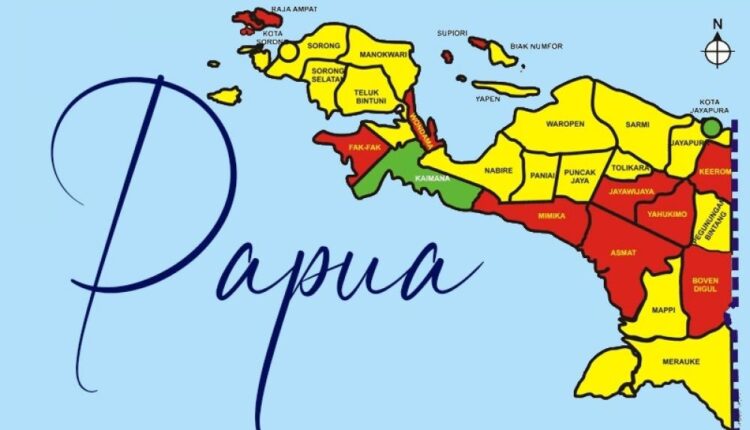Inclusive Development of Papua as an Integral Part of the Republic of Indonesia
By: Grasella Wandama )*
Papua 2024 is an important momentum for Papua, a province rich in culture and natural resources, to achieve more inclusive development. In the context of the Unitary State of the Republic of Indonesia (NKRI), strengthening Papua’s position as an integral part is not only determined by central government policies, but also by the active participation of local communities in the development process.
Inclusive development in Papua is very important considering the challenges faced by the community. The inequality of access to education, health, and infrastructure is still striking. The latest data shows that there are still many areas in Papua that are difficult to reach and do not have adequate access to basic services. Therefore, a holistic and sustainable development strategy is needed.
In an effort to support the infrastructure and one million hectare rice field project in Merauke, Papua, the main focus at this time is the construction of road infrastructure. Within one month, this project has succeeded in pioneering a 16.8 kilometer road that will connect four districts: Ilwayab, Kaptel, Ngguti, and Muting.
The latest developments show that the paving of the road with stone material has reached 3.3 kilometers. The paving starts from the planned port in Wanam Village, Ilwayab District, and extends to Kaptel District. To meet the need for stone material, dozens of barges and ships are deployed to transport stones from outside Papua to the construction site.
Project Operations Assistant, Denny Ramdhani, explained that all available potentials and fleets will be deployed to make Papua’s development a success. All facilities, both land, sea, and air, will be used to support this development.
Therefore, the main focus of the project is to open road access so that the mobilization of heavy equipment and vehicles can be carried out more smoothly. Isam, the leader of the rice field printing initiative, emphasized his commitment to overcoming the existing challenges. He hopes that the construction of this road can run smoothly, not only to support the rice field printing project, but also to improve accessibility for the local community.
Infrastructure development, such as government buildings and other institutions, is also no less important. Cooperation between local and central governments is needed to realize infrastructure projects that can change the face of Papua.
Construction of the Central Papua Governor, DPRP, and MRP offices is scheduled to begin in January 2025. The project aims to improve the effectiveness of governance and public services in the region.
Acting Governor of Central Papua, Dr. Ribka Haluk S.Sos., MM., expressed his commitment to accelerate infrastructure development and welcomed the plan positively. He emphasized the importance of having a modern government office to support better governance, and hoped that the Central Papua government center could become a national-scale example for other New Autonomous Regions (DOB).
The DPRP chairman also emphasized that the new office will function as an efficient administrative center, making it easier for the public to access government services. He hopes that this development will create jobs for the local community, thus supporting the regional economy. The local community is also involved in the planning process for this development.
Community leaders expressed their hope that the project would meet the needs and aspirations of the residents, as well as create a better environment for daily life. The progress of the Papua region cannot rely solely on the Central Government, but the regions also have a central role in advancing the region. No less important in making every policy a success is the support of the wider community. The entire community must have a common vision in advancing Papua, so that everything can go hand in hand, both in implementing infrastructure development, public services, as well as in the fields of agriculture and economy and politics. All must be in harmony so that there is no social jealousy among the elements of the nation there.
With the start of this project, it is hoped that Central Papua will become more advanced and prosperous, with adequate infrastructure to support regional development and community welfare. Development that focuses on community needs is expected to improve accessibility and public services, as well as encourage local economic growth.
The commencement of the construction project of the Governor’s Office, DPRP, and MRP of Central Papua, is expected to bring significant progress and better welfare to the Papua region. This project is designed to provide adequate infrastructure, thus supporting the development of government and public services.
Efficient infrastructure development in Papua is expected to not only improve governance, but also have a positive impact on the community. With better facilities, the community will have easier access to the services they need, thus improving their quality of life.
In addition, this project has the potential to create new jobs for local residents. By involving the community in various aspects of development, it is hoped that a strong sense of ownership of the project results will be created and active participation in regional development will be encouraged. Finally, achieving inclusive development in Papua is not impossible.
With the commitment of all parties, including the government, society, and the private sector, Papua can achieve sustainable development. Through real steps, Papua remains an integral part of the Republic of Indonesia, but also becomes an example of development that can be emulated by other regions.
With concrete steps and strong collaboration, Papua will not only maintain its position as an integral part of the Republic of Indonesia, but can also be an example for other regions in terms of inclusive and sustainable development. The success of Papua’s development is expected to inspire other provinces to follow in Papua’s footsteps in optimizing local potential for mutual progress.
*) The author is a Papuan student living in Jakarta
